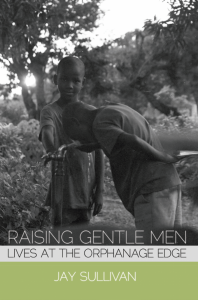Interview: Jay Sullivan of Raising Gentle Men
Posted on March 15, 2013 at 8:00 am
Jay Sullivan‘s new book, Raising Gentle Men: Lives at the Orphanage Edge, is the story of his experience as the only man living in a Kingston, Jamaica convent, helping to care for 250 orphan boys. It is a beautifully written and inspiring story. Sullivan generously took time to answer my questions about his experiences.
How did you first come to the orphanage in Jamaica?
I got there one step at a time. My first year in Kingston, I walked by the orphanage grounds each day on my way to St. George’s College, the Jesuit high school where I taught English. When I was asked to help run the school’s ministry program, I needed a place to take my students where they could work with less-privileged people. What better than the orphanage around the corner? From that initial interaction, my involvement with the place grew, and I eventually moved in.
What kind of training did you have in religion or education before your arrival?
I majored in English at Boston College, but hadn’t had any formal training as a teacher. In fact, only one of the dozen BC teachers sent to Kingston in 1984 came from the School of Education. The week before we landed in Kingston we went on a retreat to talk about our faith and our role at our schools. Two nuns, veteran teachers themselves, spent a day giving us pointers on lesson plans and maintaining discipline. The only line that stuck with me was, “Don’t smile until Christmas.” It’s a classic line for teachers. It means if you are strict for the first few months, you can loosen up after that. But if the kids think you are a pushover at the start, they will walk all over you. I wish I had heeded the nuns’ advice. My first year I was a disaster when it came to discipline. But I learned my lesson by the second year.
What was the biggest surprise of your time there?
Like everyone my age, I had just finished 16 years in a classroom, but had experienced that room from only one perspective. Becoming a teacher, looking at the class from the front instead of the back of the room, changed my perspective on what had been going on for the last 16 years. That alone was a huge learning curve.
How were the nuns different from what outsiders might expect?
I think most people assume nuns are serious and austere. My Aunt Dolores was a Sister of Charity. I grew up knowing her and some of her nun friends, who were the friendliest, happiest, most jovial people, always laughing and teasing each other. The nuns at Alpha were of the same ilk. There were certainly one or two that wore a dour face, and clearly, they all knew how to keep order, but their cheerfulness might have surprised people.
What did the boys want to know about you?
The boys were used to people coming and going at the orphanage, so their questions were simple. My freckles and red hair piqued their interest more than anything else.
Were the boys supportive of each other?
I was always amazed at their generosity with each other. If one of them got a special treat of some sort, he always wound up sharing it among whatever boy put out a hand. I don’t know if that’s because they each knew hunger all too well, or because they were relatively well fed at Alpha and didn’t need to worry about their next meal. They also supported each other emotionally. When one scored a goal on the field, won at a game of cards, or was praised by a staff member for a good deed, the others would cheer him on. Of course, they also teased each other, just like any other group of boys.
Do you have a favorite Bible passage or prayer?
I love the Prayer of St. Francis. Its call to action is a theme throughout the book.
What was the best advice you got while you were in Jamaica?
Sister Magdalen talked a lot, but she wasn’t into dispensing advice. Everything I learned from her and the other sisters was from watching their actions. The way Magdalen took each day as it came, controlled only what she could, and let God handle the rest was the biggest lesson I learned.
What made you decide it was time to write the book?
I thought that 20 years was enough time to “think about” writing a book. My wife and kids also let me know it was time to either write it or stop talking about it. I’m sure many men accomplish their goals in life simply because their wives tell them, “Enough talk already. Get it done.”
How does the understanding you gained in Jamaica influence your life today?
In Jamaica, I talked with the boys each evening about their lives. I gained an appreciation for how diverse the human experience can be, and yet how similar we all are in seeking the essential human needs of camaraderie, companionship and knowing that we are part of something larger than ourselves. That experience has helped me challenge my assumptions about others, and stay focused on the basics about human nature when I deal with people. Both have helped me a great deal in my role as a communication skills coach. I still have a lot more to learn in this area.
What advice would you give someone who is about to begin the kind of work you describe in the book?
Stay open to the ideas you see and hear in others with more experience. Approach the work knowing you can accomplish a great deal, but step carefully, and with great humility.
